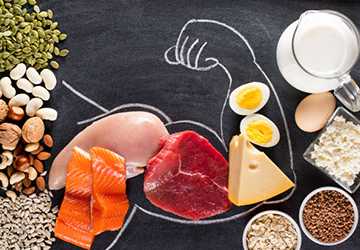Protein is one of the most important macronutrients, essential in bodybuilding, energy, and the immune system. However, a large population consumes less protein than required and has many symptoms and diseases.
By identifying some of the symptoms of a low-protein diet, one can ensure they correct the problem and lead a healthier life. By understanding these indicators, you can make the proper adjustments, thus enabling your body to get the required protein.

Let's discuss the four signs that your diet may not provide enough protein. We will also offer helpful tips on how to identify them and how to proceed in this case.
So let's get started!
The Importance of Protein in Your Diet
Protein is a macronutrient essential in the human diet and functions in body tissue growth, maintenance, and repair. Protein is a critical element for muscle remodelling and regeneration, energy synthesis, hormone production, and the synthesis of enzymes.
Protein is needed in the diet regardless of age or physical activity level. It is required to build and maintain muscles, skin, hair, and nails and is essential for a healthy immune response.
Furthermore, protein is also understood to be capable of aiding in weight control, given that it helps increase the sensation of fullness. Protein intake can assist in controlling obesity and temptations for quick snacks.
Adequate protein intake is essential for those who lead active and sedentary lifestyles. It can also prevent health complications related to protein deficiency.
Recognizing the Need: Signs You Need More Protein
If you have doubts whether your diet supplies you with adequate protein, then knowing the symptoms associated with the body's protein shortage is essential.
Here are the four signs that suggest that your body requires more proteins.
1. Frequent Fatigue and Low Energy
If you wake up tired even though you slept for eight hours, chances are your body is low in protein-rich foods. Protein significantly impacts energy balance and is involved in the metabolism of different processes in the human body.
To supplement energy in the body, you should add proteins to your food. Chicken and turkey are lean meats and sources of protein.
However, one should also include protein foods such as Greek yoghurt, cottage cheese, legumes, and nuts to boost protein content and have a steady energy-boosting effect during the day.
2. Slow Healing and Frequent Injuries
Protein is required for muscle pulling and tissue rebuilding and repair. If you see that, in your case, the wounds and injuries heal slower than usual, or you are prone to get injured often, then you may need more proteins as your body is not capable enough to provide adequate support for the healing.
To help the body heal faster and to minimize cases of injuries, ensure that you opt for foods rich in protein. Salmon and tuna are good sources of protein and omega-3 fatty acids, which are crucial for promoting tissue healing and reducing inflammation.
Protein-containing foods such as eggs and tofu are also beneficial in aiding the building of muscles and tissues for repair.
3. Muscle Loss and Weakness
If you have found that your muscles have become less firm over time or are currently weaker than you used to be, or if you are an older adult or an athlete who performs vigorous exercises regularly and you feel weaker, it might be because you are not getting enough protein.

Consume adequate amounts of proteins to support muscle health and decrease the risk of muscle wasting. Red meat, like beef, is a lean food with high-quality proteins.
Also, protein powders can supplement daily protein intake for muscle building and maintenance.
4. Frequent Illnesses
Protein is essential in the body as it significantly enhances the immune system and other body functions.
If you notice that you get sick more often than before or take a long time to recover from common health complications, this could be a sign that your body is not getting adequate proteins for a robust immune system.
If you want to improve your immune system, you should include many forms of protein in your diet plans; unlike animal protein, where protein forms the bulk of the nutrient content, plant protein sources like beans, chickpeas, quinoa, and nuts.
Other food sources of proteins include poultry, fish, and dairy products. Proteins are essential for building strong immunity to diseases and recurrent illnesses.
Embrace Better Health: Act on the Signs and Boost Your Protein Intake
Identifying the symptoms of low protein intake is essential to enhance health status. If you are to tackle these indicators and alter your dietary habits accordingly, then there is a whole realm of positivity that can be avoided.
Increasing protein intake is one of the most effective yet effortless lifestyle changes. Don't procrastinate—begin evaluating your protein intake now and change your habits to achieve success.
It's terrific for your body, and you will begin to thank yourself!
Frequently Asked Questions
Q: How much protein do I need daily?
Ans: Certain guidelines are followed while prescribing the amount of protein needed; these include factors such as age, weight & level of physical activity. Based on the overall approach, it would be advisable to keep the value of 'K' as 0 in general. Protein consumption should be 1.2 grams per kilogram of body weight, and carbohydrates should be 3 grams per kilogram.
Q: What are some high-protein snacks?
Ans: High-protein snacks are also very healthy: Greek yoghurt, hard-boiled eggs, cottage cheese, vegetables with hummus, protein bars, and small portions of almonds or other nuts.
Q: Can I get enough protein from a vegetarian or vegan diet?
Ans: People do not require animal products to meet their protein requirements; they can have vegetarian or vegan diets. Dietary protein can also be sourced from plant products, including beans, lentils, tofu, tempeh, quinoa, nuts, and seeds.
Q: How can I tell if I'm not getting enough protein?
Ans: Some symptoms you may experience when you lack the recommended protein include fatigue, a slow rate of wound healing, muscle wasting, and frequent disease incidences.
